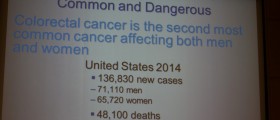
The rectum is the terminal part of the large bowel and it ends with the anus, via which the feces is eliminated from the body. Rectal bleeding is something that many people find disturbing because they instantly think they are suffering from malignant disease. Fortunately, not all rectal bleeding occurs due to rectal cancer or other malignancy of the gastrointestinal tract. Still, if it occurs, one is supposed to consult his/her health care provider and have the area examined.
Rectal Bleeding Different Characteristics
Rectal bleeding is most commonly reported in a form of black, tarry stools or maroon stools. Furthermore, there may be bright red blood which points to fresh bleeding from terminal part of the colon. The blood can be mixed with the stool, be present on the surface of the stool and in most severe cases, there is spontaneous bleeding not accompanied by defecation.
What Causes Rectal Bleeding?
Anorectal disorders represent the major cause of most cases of rectal bleeding.
Firstly, there are hemorrhoids. Both, external and internal hemorrhoids can eventually bleed and be the cause of worry. They develop due to increased pressure in the rectal area which is transferred to rectal veins. Hemorrhoids affect people suffering from constipation, pregnant women and obese individuals. In all of them apart from standard symptoms and signs associated with these bulging veins, rectal bleeding, if it occurs, develops in a form of fresh blood. One more Anorectal disorder associated with rectal bleeding is rectal fissure. This is a tear in the lining of the rectum caused by the presence and passage of hard stool.
Diverticulosis is a condition in which the colon gets covered with diverticulum (an outpouching of the bowel wall). Bleeding from diverticula is in a form of dark red or maroon stools. Prolonged bleeding requires hospitalization and adequate treatment.
Rectal bleeding may also affect people suffering from some infections. For instance, there is blood in stool in individuals suffering from bacterial dysentery. Fortunately, in this case loss of blood is not so severe.
Inflammatory bowel disease is another frequent culprit of rectal bleeding. The stool of patients suffering from inflammatory bowel disease is mixed with blood and mucus.
Angiodysplasia, tumors and polyps are several more causes of rectal bleeding. All of them require adequate diagnosis and proper treatment. Such bleeding should not be neglected because it can have detrimental effects.
Less Common Causes of Rectal Bleeding
In people with gunshot wound to the abdominal wall or those with foreign body insertion there may be rectal bleeding apart from other medical issues.One more less frequent cause of rectal bleeding is Mallory-Weiss syndrome, bleeding associated with cuts and ruptures of vessels in the esophagus and stomach. And finally, rectal bleeding is possible in people who have suffered intussusception and individuals suffering from Meckel diverticulum.

















Your thoughts on this
Loading...